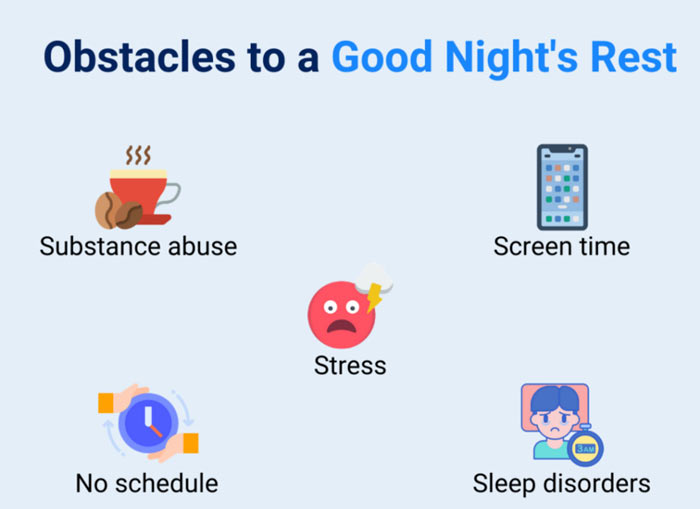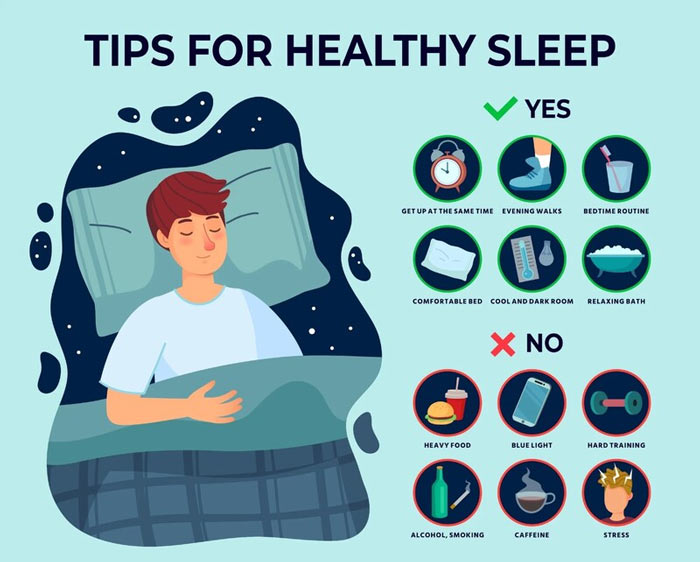Maintaining a consistent, healthy sleep schedule proves challenging in the fast-paced world we inhabit today. A multitude of individuals grapple with irregular sleep patterns. It’s a predicament that often culminates in various health issues. This article explores practical strategies to rectify your disrupted sleep cycle, optimize routine slumber periods, and foster sound sleeping habits for enhancing comprehensive well-being.
Understanding the Importance of Sleep
Exploring the specifics of adjusting your sleep schedule requires a recognition of quality sleep's significance. Sleep significantly influences physical health, mental well-being, and overall productivity. Thus, its importance cannot be understated. Contributing to improved mood, enhanced cognitive function, and bolstered immune system is adequate and restful sleep.
Common Causes of Sleep Schedule Disruptions
The first step to establishing a healthier routine involves identifying the root causes of irregular sleep patterns. Factors including stress, irregular work hours, excessive screen time, and poor sleep hygiene can significantly impact your sleep quality and consistency.
Tips for Sleep Schedule Adjustment
Let's now delve into the practical strategies for effectively adjusting your sleep schedule:
1. Gradual Changes:
Why Gradual Changes Matter: Your body may experience a shocking effect and find it challenging to adapt when you make abrupt adjustments to your sleep schedule. However, if you shift your bedtime and wake-up time gradually by 15-30 minutes every few days, your body can acclimate more smoothly.
The Adaptation Process: Acknowledge that your body possesses an inherent internal clock. Abrupt modifications can disturb, or even disrupt this innate rhythm.
However, through strategic incremental alterations, you communicate to your body the necessity for a revised sleep schedule.
2. Consistent Bedtime Routine:
Creating a Pre-Sleep Ritual: When you establish a consistent bedtime routine, you effectively signal to your body that it's time for relaxation. Engage in activities conducive to calm before bed such as reading a book, indulging in a warm bath, or practicing relaxation exercises.
This disciplined sequence conditions your body to recognize when it’s time to prepare for sleep.
Benefits of Routine: Not only does a bedtime routine calm your mind, but it also establishes a predictable pattern for your body. This makes transitioning from wakefulness to restfulness easier. The association between routine and impending sleep is strengthened by consistency.
3. Limiting Screen Time:
Impact of Screens on Sleep: Blue light, emitted by electronic devices, may disrupt the production of melatonin that’s a hormone that induces sleep. To mitigate this interference with your sleep-wake cycle, limit screen time to at least one hour before bed.
Establishing a Digital Curfew: Set a specific time for powering down electronic devices to implement a "digital curfew." This strategy, by reducing exposure to stimulating content and blue light emission, facilitates your brain's transition into a sleep-conducive state.

4. Natural Light Exposure:
Morning Sunlight: Spend time outdoors, particularly during the early hours, to signal your body's internal clock that it is time for awakening. Exposure to morning natural light aids in regulating this process.
Dim the Lights in the Evening: As bedtime draws near, diminish your exposure to intense lights, particularly electronic screens. By dimming these illuminations, you signal to your body that it is time for relaxation and winding down.
5. Consistent Sleep and Wake Times:
Weekends Included: Maintaining a consistent sleep schedule even on weekends that tempt you to sleep in reinforces your body's internal rhythm.
6. Avoiding Naps Late in the Day:
Short, Early Afternoon Naps: Should you require a nap, schedule it for the early afternoon and limit its duration to 20-30 minutes. Interference with nighttime sleep can occur if you indulge in a nap too close to your intended bedtime.
7. Mindful Eating and Drinking:
Avoid Heavy Meals Before Bed: Indigestion is disruptive to sleep. It can be mitigated by ensuring the completion of your last substantial meal several hours before your sleep time.
Limiting Fluid Intake: To mitigate the chances of nocturnal bathroom trips, you should minimize liquid intake before bedtime. Chugging half a liter of water right before bed is never a good idea, eh?
8. Relaxation Techniques:
Progressive Muscle Relaxation: Before bedtime, engage in the practice of progressive muscle relaxation. This will effectively release tension and promote overall body relaxation.
Guided Imagery or Meditation: To cultivate a sleep-conducive mental state, actively participate in guided imagery or meditation exercises. These practices not only calm the mind but also foster peace within it.
9. Caffeine and Alcohol Awareness:
Caffeine Moderation: In the afternoon and evening, restrict your intake of caffeine. This stimulant can disrupt your sleep initiation.
Moderate Alcohol Consumption: Though alcohol's initial effect may induce drowsiness, it later disrupts your sleep cycle. Moderate your consumption of alcohol and endeavor to finish drinking a few hours before bedtime.
10. Wind-Down Activities:
Reading or Listening to Soothing Music: Before bedtime, engage in soothing activities like reading a book or listening to calming music. These actions signal your body that it is time to relax.
Journaling: Consider recording your thoughts or devising a to-do list for the upcoming day. This practice can aid in mental decluttering before you sleep.
Keep in mind that crafting a consistent and healthy sleep schedule is not an overnight endeavor. It demands both patience and commitment. Go ahead and experiment with these tips!
Seek out the combination that suits you best, then make necessary adjustments as required. If your routine aligns perfectly with your natural daily rhythm which is a significant contributor to enhanced sleep quality and overall well-being, you've struck gold!
Sleep Routine Optimization
Optimizing your overall sleep routine beyond mere adjustments to your sleep schedule can significantly enhance the quality of a night's rest.
- Comfortable Sleep Environment
Invest in a quality mattress and pillows to create an environment conducive to comfortable sleep. Additionally, ensure your bedroom promotes uninterrupted rest by maintaining your preferred temperature. Guarantee darkness and cultivate calm by minimizing noise.
- Regular Exercise
Regularly incorporating physical activity into your routine can enhance the quality of your sleep. Opt for moderate exercises like walking or jogging during daylight hours to bolster nighttime rest. Nevertheless, steer clear from engaging in vigorous exercise near bedtime.
Healthy Sleep Habits for Long-Term Success
For long-term success in consistently achieving a sleep schedule, you must critically prioritize the construction and maintenance of healthy sleep habits.
- Prioritizing Sleep
Acknowledge the significance of sleep in cultivating your overall health and well-being. Thus, prioritize it and allocate ample time for necessary rest each night.
- Avoiding Stimulants
Especially in the hours preceding bedtime, you should limit their intake of stimulants including caffeine and nicotine. Such substances may disrupt your capacity to initiate sleep and sustain a profound state throughout the night.

- Seeking Professional Help
If persistent sleep issues persist, you should consider seeking guidance from a healthcare professional or sleep specialist. They can evaluate your situation and offer personalized recommendations to tackle specific challenges related to sleep.
Time to put it to bed…
In conclusion, fixing your sleep schedule necessitates a blend of gradual adjustments. It demands consistent routines and, crucially, the fostering of healthy sleep habits. By comprehending the significance of quality rest and actively incorporating these strategies, you pave an avenue for enhanced overall well-being and productivity in daily life.




